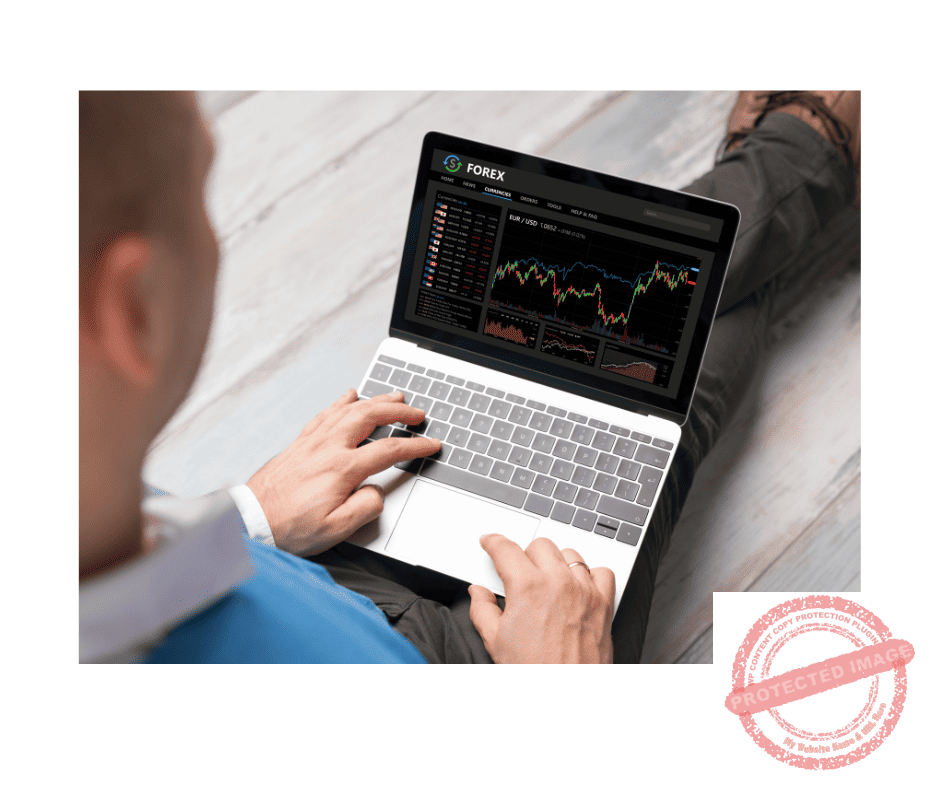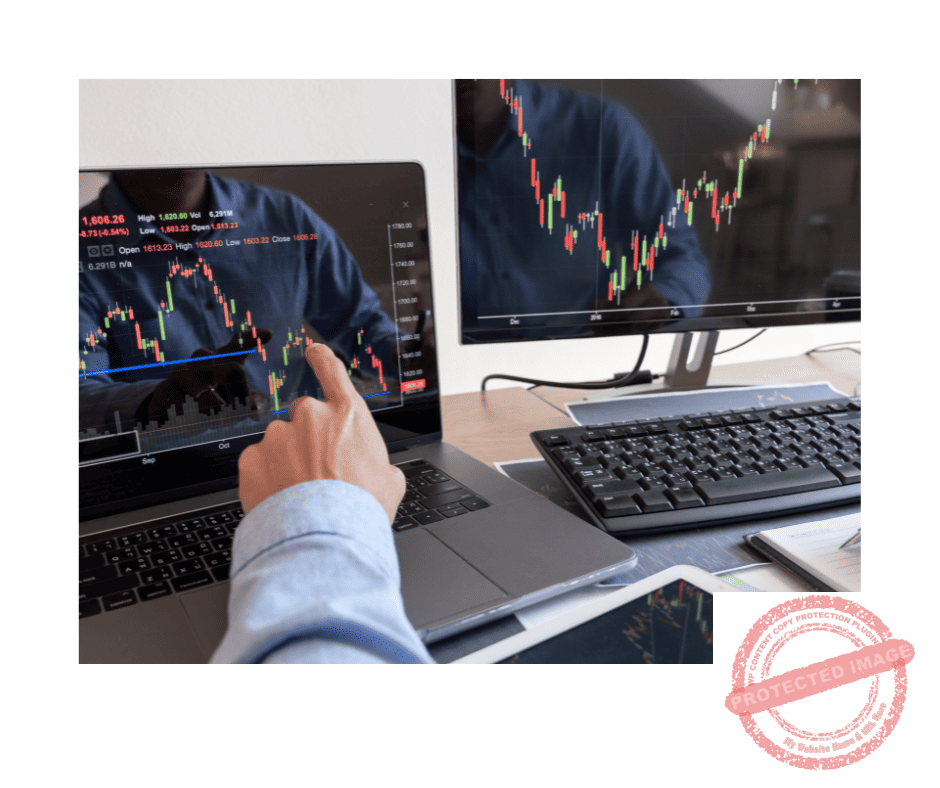Improving your Forex trading requires meticulous preparation and a strong foundation.
It is essential to equip yourself with a solid plan encompassing the basics of trading, various strategies, risk management principles, and insights into the psychology that underpins successful trading.
Moreover, practicing with a demo account allows you to hone your skills without risking your hard-earned capital.
While the allure of substantial profits in the world’s largest financial market is undeniably attractive, it’s crucial to acknowledge that Forex trading is not a guaranteed path to wealth; it carries inherent risks.
Building a robust foundation through education and experience is the key to unlocking the doors of success in Forex trading.
In this article, I share concepts, tactics, and strategies that will empower you to trade the Forex market confidently and competently.
How Important is Education to Improving Your Forex Trading?
To succeed in Forex trading, you need knowledge to navigate the market.
Starting with the basics, such as understanding currency exchange concepts and trade execution, is crucial.
However, your education should extend far beyond that. Becoming a proficient Forex trader requires a comprehensive grasp of various aspects.

From learning about the roles of market participants to exploring diverse trading strategies, understanding trading psychology, mastering leverage and margin, and staying compliant with regulations, each piece of knowledge contributes to your trading prowess.
Furthermore, practicing with a demo account and staying informed about evolving market trends through various educational resources are integral to your journey.
In Forex trading, where emotions, strategies, and numbers converge, your education is not just an option; it’s your roadmap to success in Forex trading.
Are You Improving Your Forex Trading When Selecting a Broker?
Choosing the right Forex broker is a crucial decision that can significantly impact your journey as a trader.
One should not take the choice lightly; instead, one must thoroughly consider several critical factors.
Regulatory compliance, trading platform quality, competitive spreads and fees, and account type availability shape your trading experience.
Moreover, responsive and supportive customer support channels, convenient and secure deposit and withdrawal options, and access to research tools and educational resources contribute to a broker’s suitability.
Reputation and reviews from fellow traders offer valuable insights into a broker’s reliability and customer service quality.

At the same time, the opportunity to test the platform through a demo account provides a risk-free glimpse into the trading environment.
Understanding leverage options and ensuring scalability to accommodate your evolving trading needs are also essential considerations.
With all these factors in mind, choosing your Forex broker is a cornerstone decision defining your trading performance and satisfaction.
Therefore, it is imperative to approach this selection process with diligence and care to pave the way for a successful trading journey.
What Does it Mean to Create a Well-Defined Trading Plan?
If you want to succeed at Forex trading, crafting a robust trading plan is not merely a suggestion but a foundational necessity.
This plan dictates your decisions in the Forex market and serves as a blueprint for your trading activities.
It encompasses a range of crucial elements, including setting clear and achievable trading goals to keep you motivated and on track.
Defining your trading strategy, whether rooted in technical, fundamental analysis, or a blend of both, is pivotal. Your plan should detail entry and exit criteria, risk-reward ratios, and chosen timeframes.
Risk management is paramount, with guidelines for capital allocation and stop-loss usage to protect your assets (typically recommended at 1-2% of your capital per trade).

Position sizing is another vital aspect of ensuring your capital allocation aligns with your risk tolerance and account size.
Establishing a consistent trading schedule matching your chosen trading style, whether a day, swing, or position trading, is essential for maintaining discipline.
Precisely defined entry and exit rules, informed by technical indicators or price levels, reduce ambiguity in your trading decisions.
Keeping a meticulous trading journal with comprehensive records of your trades, their reasons, and outcomes fosters learning and accountability.
Your trading plan should remain adaptable to adjust to shifting market conditions.
Emotion management, especially fear and greed, is crucial for maintaining discipline, and your plan should address psychological preparation.
Finally, regular reviews and refinements of your trading plan ensure it evolves with your growth and experience as a trader.
A well-structured trading plan is your guiding star in the dynamic Forex market, enhancing your skills, promoting consistency, and safeguarding emotional control.
Remember, your plan is not static; it should evolve and adapt as you progress as a trader.
Improving Your Forex Trading with a Demo Account Before Going Live
Demo accounts are essential for novice Forex traders to learn and succeed.
Its significance lies in its capacity to provide a risk-free environment for traders to acquaint themselves with the intricacies of the Forex market.
By utilizing a demo account effectively, traders can reap many benefits, from becoming familiar with the trading platform and honing their order placement skills to testing and refining their trading strategies.
The absence of real capital at risk makes it an ideal setting for experimenting with various risk management techniques, such as setting stop-loss and take-profit levels.
Moreover, a demo account facilitates the development of practical experience by allowing you to observe currency pairs, track news events, and gauge market volatility, all contributing to their growth as traders.

Most importantly, this invaluable tool provides a controlled environment to practice and instill the emotional discipline necessary for consistent and profitable trading.
Furthermore, it enables you to assess whether Forex trading aligns with your personality traits, risk tolerance, and level of dedication.
Through meticulous record-keeping and analytical assessments of your demo trades, you can identify areas for improvement and establish a structured trading routine.
As a means of setting clear objectives and goals for your demo trading endeavors, you can remain motivated and focused throughout the learning process.
A demo account is crucial for any forex trader’s future proficiency.
It provides valuable knowledge and experience without any financial risks.
What are Effective Risk Management Strategies?
Good risk management is the foundation of success in Forex trading.
Risk management involves a multifaceted approach, encompassing various strategies and techniques safeguarding your trading capital.
First and foremost, prudent traders limit the amount of capital exposed to risk in each trade to a modest 1-2% of their total capital.
They understand the significance of setting predefined exit points through stop-losses, unwaveringly adhering to these safeguards to limit potential losses.
Diversifying one’s trading portfolio across multiple assets is an effective risk mitigation strategy, spreading investments to reduce exposure to any asset’s fluctuations.
Precise position sizing, aligned with individual risk tolerance, is another critical element of risk management.
Over-leveraging, often seen as a quick path to riches, is anathema to astute risk management, with traders advised to employ leverage conservatively, aiming for a ratio of 10:1 or lower.

Vigilance in staying informed about major economic events and being prepared to adjust tactics is paramount in managing risk effectively.
Recognizing the impact of correlations between currency pairs further enhances risk awareness, as interconnections between assets can influence exposure.
Regular assessment and adjustment of risk management strategies to align with one’s evolving trading style is a mark of a prudent trader.
Keeping a comprehensive trading journal, meticulously documenting trades and risk management decisions, serves as both a learning tool and a record of effectiveness.
Psychological preparedness, understanding one’s risk tolerance, and the emotions accompanying trading are integral to effective risk management, promoting discipline amidst market volatility.
Moreover, setting drawdown limits and constraining the maximum allowable loss are added layers of protection against emotional trading and capital erosion.
Effective risk management is crucial for safeguarding your capital and improving your Forex trading.
It helps maintain your funds and looks for growth opportunities amidst the market’s fluctuations.
Improving Your Forex Trading Through Emotional Management
Regarding Forex trading, balancing emotions and setting realistic goals is essential.
Emotions, such as greed and fear, can distort one’s perception of reality, leading to impractical expectations.
Acknowledging these emotional hurdles and implementing techniques to control them is essential.
Practices like mindfulness, meditation, and regular breaks from trading can help maintain emotional equilibrium.

Learning from past mistakes is a valuable component of this process, allowing you to refine your emotional responses and enhance decision-making.
Mastering trading psychology is an integral facet of Forex trading success.
Emotions like greed, fear, overconfidence, and the urge for revenge can pose significant challenges to your journey.
Overcoming these hurdles involves several strategies:
- Developing a comprehensive trading plan and adhering to it
- Setting realistic expectations
- Practicing patience
- Choosing stop-loss levels judiciously
- Maintaining a detailed trading journal
- Engaging in mental preparation
- Taking regular breaks to decompress
- Continuously learning about the market
- Implementing effective risk management techniques
- Embracing losses as part of the learning process
- Seeking external support while engaging in self-assessment.
Managing emotions and fostering a disciplined mindset are indispensable components toward consistent profitability and sustainable growth in the Forex market.
Improving Your Forex Trading by Continuous Learning and Adaptation
To be successful in Forex trading, it’s essential to keep learning and be adaptable.
This means staying up-to-date with new information and being willing to adjust your approach as needed.
Forex markets are inherently dynamic and influenced by many factors, such as evolving market conditions, technological advancements, and emerging risks.
Traders interested in continuous learning must be informed about global events and market developments.
You should tap into educational resources like books, courses, and webinars, seeking insights and knowledge that keep you ahead of the curve.
Joining trading communities and seeking mentorship can provide invaluable guidance and support.

Regularly reviewing and analyzing trades for areas of improvement is an indispensable aspect of this learning process.
It’s important to keep learning and adapting to succeed in Forex trading.
How To Safeguard Your Capital
In Forex trading, you cannot succeed without risk and money management.
Risk and money management preserve your trading capital, ensuring the sustainability of your account over the long term, fostering emotional control, and facilitating steady account growth.
To effectively implement risk and money management strategies, traders must adhere to fundamental principles such as:
- Limiting risk per trade to a modest 1-2% of their capital
- Aligning trade size with their risk tolerance
- Utilizing stop-losses and take-profit levels to define exit points
- Aiming for a favorable risk-reward ratio of 1:2 or better
- Diversifying their trades to reduce risk
You must remain vigilant about adjusting positions based on correlations and setting drawdown limits to prevent emotional trading.
Achieving success in Forex trading through risk and money management necessitates unwavering discipline, the integration of these principles into a comprehensive trading plan, regular reviews and adjustments based on performance and market conditions, and a commitment to continuous education.
Additionally, traders must cultivate psychological control to counter the disruptive influences of fear and greed on their risk plans.
Embracing risk and money management as a continuous process allows you to adapt to account size and risk tolerance changes, safeguarding their capital and paving the way for longevity and success in Forex trading.

Trading Discipline is Vital to Improving Your Forex Trading
Success in Forex trading requires discipline. To achieve it, traders must be consistent in their approach.
To succeed in Forex trading, traders must develop discipline in various aspects such as consistency, emotional control, risk management, plan execution, and reducing impulsiveness.
Trading discipline requires a journey of self-improvement that traders must embark on.
This journey includes:
- Creating a meticulous trading plan
- Defining clear and unwavering trading rules
- Maintaining a comprehensive trading journal
- Practicing mental preparation
- Pursuing continuous education
- Engaging in self-assessment and accountability
As challenges arise, you must combat impatience with patience, manage the potent influences of fear and greed, sidestep the pitfalls of revenge trading, and remain vigilant against overconfidence.
Furthermore, discipline is not a static attribute but an evolving one that matures with experience, marking each achievement as a significant milestone in your journey.

How the Path to Excellence is Continuous Self-Assessment
Self-assessment is crucial for success in Forex trading.
This practice encompasses multifaceted dimensions, including:
- Performance evaluation to measure strategy effectiveness and pinpoint strengths and weaknesses
- Adaptation and learning to cultivate a flexible mindset that adapts to evolving markets and refines one’s approach
- Risk mitigation to identify vulnerabilities and enhance risk management
- Emotional control to scrutinize emotional responses and nurture rational decision-making
- Maintaining a meticulous trading journal,
- Regularly reviewing and updating the trading plan
- Analyzing past trades for patterns and trends
- Seeking feedback and mentorship
- Establishing performance metrics and goals
By identifying areas needing improvement through evaluating trading strategies, risk management techniques, emotional responses, and adherence to the trading plan, you can create actionable plans for enhancement, embracing losses as invaluable learning opportunities.
Self-improvement is not a destination but an ongoing journey marked by unwavering discipline, accountability, and a commitment to continuous learning.

How to Improve Your Forex Trading with a Journal
In Forex trading, a trading journal is indispensable.
With its capacity for objective assessment, a trading journal quantitatively tracks and evaluates performance, offering invaluable insights into strengths and weaknesses.
It becomes a mirror, reflecting emotional states during trades and a yardstick for measuring adherence to risk parameters, fostering emotional control and risk management.
Moreover, it nurtures a culture of continuous learning by enabling you to glean wisdom from successful and unsuccessful trades.
The components of a trading journal encompass trade entry details, reasons for the trade, emotional state, risk parameters, trade management, outcome, post-trade analysis, and statistical analysis.
To implement this tool effectively, you must choose a physical or digital format and commit to recording consistently and accurately.
Regularly reviewing the journal and adapting strategies based on its insights are crucial steps in the improvement journey.
Discipline and accountability are the bedrock of a trading journal’s effectiveness, leading to enhanced skills, structured trading approaches, and the objectivity needed for success.

Why Psychology is Improving Your Forex Trading
Trading Psychology is the silent force shaping your trading, influencing every aspect of your decisions and outcomes.
Embracing trading psychology means mastering emotional control to ward off impulsive choices, upholding discipline to stay true to your plan, and weaving risk management into the fabric of your psychological mindset.
To improve trading psychology, you must embark on a journey of self-discovery, cultivating self-awareness, emotional regulation, and a mindset that thrives on positive self-talk.
Having a clear trading plan can help you stay grounded during emotional stress.
Additionally, mental resilience can help you overcome setbacks and view losses as necessary steps to success.
Staying informed and educated arms you with knowledge, reducing anxiety and bolstering confidence.
Demo trading environments provide a safe space for practice and experience, all while honing your ability to focus on the process rather than fixating solely on outcomes.
Engaging with trading communities offers support and perspective, underscoring the importance of camaraderie in this challenging endeavor.
However, be prepared to confront common psychological challenges like the fear of loss, the allure of greed, the temptation of revenge trading, and the pitfall of overconfidence.
Should psychological challenges persist and cast a long shadow over your trading, seeking professional help is a courageous and wise step.
It’s a journey, not a destination, that can lead to profound personal and financial growth.

Why Backtesting is a Flawed Approach to Improvement
Due to its inherent limitations, relying on backtesting is inadequate to achieve consistent success in Forex trading.
Historical data, while valuable, lacks real-time factors, making it challenging to adapt to rapidly changing market conditions.
Forex markets exhibit dynamic shifts that necessitate flexible strategies, while the finite scope of available historical data can lead to overfitting and unreliable results.
Past performance is no guarantee of future success, and real-time execution challenges often need to be accounted for in backtesting.
Moreover, over-optimization risks loom large, including a lack of generalizability to live markets, sensitivity to minor changes, complexity, and inadequate risk management, often creating an illusion of past success that doesn’t hold up in dynamic conditions.
The lack of adaptability in backtested strategies stems from the ever-changing nature of market conditions, the influence of economic events and news releases, the non-stationary behavior of Forex markets, and the risk of strategy staleness, leading to real-time decision-making challenges and potential loss of confidence.
To achieve Forex success, you must complement historical data with real-time analysis and adapt your strategies to the evolving nature of the market for consistent results.

Conclusion
Achieving success in Forex trading is a challenging yet gratifying endeavor that demands unwavering dedication and a commitment to continuous learning.
To thrive in this challenging endeavor, you should embrace several fundamental principles.
First and foremost, staying informed about market intricacies, global events, and economic developments is essential for making well-informed decisions.
A comprehensive trading plan encompassing effective strategies, rigorous risk management, and emotional control is crucial for consistent success.
Patience and persistence are invaluable virtues on this journey of continuous improvement, where every trade serves as a valuable learning experience and an opportunity to build resilience.
Sound risk management practices, including clear risk parameters, stop-losses, take-profits, and proper position sizing, are essential to preserving capital.
Moreover, mastering trading psychology by cultivating discipline, patience, and maintaining focus in the face of emotions like fear and greed is pivotal to achieving long-term success.
It’s essential to recognize that improving your Forex trading is not a destination but an ongoing expedition where patience and persistence are the path to prosperity.
What’s the Next Step?
Use this article to evaluate your current trading approach and consider where to improve.
In addition, look for opportunities to use what you’ve learned in your process.
If you need help developing an analysis process, you can use our Six Basics of Chart Analysis. If you’re unfamiliar with the Six Basics, you can learn them here for free.
The “Six Basics” will give you a strong foundation in chart analysis, which you can incorporate with what you’ve learned about improving your Forex trading.
In addition, when you get the “Six Basics,” you’ll also get Forex Forecast delivered to your inbox every Sunday.
Forex Forecast includes:
- Trade Ideas and Analysis
- I will show you the trade opportunities I’m watching using the Six Basics of Chart Analysis and Advanced Strategies.
- Case Studies from Around the Web
- Watch how applying the Six Basics worked on some of the best, most profitable trades.
- Trading Education Guides and Videos
- Want to learn most Six Basics techniques and advanced strategies?
- I produce Videos and Guides to help you learn and build a better trading practice.
- Links to New Articles
- I publish new articles on topics traders will want to know about every week, and you can find out when they post.
- Positionforex.com News
- Did something change at positionforex.com? Learn about it here first!
- Links to upcoming webinars
- Attend free webinars to improve your trading.
- And Much More
- Tools, Membership-only Videos, and more will be released in the Forex Forecast.
The best part – it’s completely free.

Frequently Asked Questions
How Can I Get Started with Forex Trading?
To start Forex trading, follow these steps:
- Educate Yourself: Learn Forex basics, trading strategies, and risk management.
- Choose a Reliable Broker: Select a regulated broker with a user-friendly trading platform.
- Develop a Trading Plan: Create a strategy, set goals, and establish risk management rules.
- Practice with a Demo Account: Trade in a risk-free environment to gain experience.
- Start Live Trading: Once confident, fund your account and begin trading with real money.
What are the Significant Risks Associated with Forex Trading?
Forex trading carries several risks, including:
- Market Risk: Currency prices can be highly volatile and unpredictable.
- Leverage Risk: Trading with leverage amplifies both gains and losses.
- Interest Rate Risk: Exchange rates can be influenced by central bank policies and interest rate changes.
- Political and Economic Events: Geopolitical developments and economic data releases can impact currency prices.
- Lack of Knowledge: Trading without proper education and strategy can lead to significant losses.
How can I Manage Risk in Forex Trading?
Effective risk management is crucial in Forex trading. Consider these risk management techniques:
- Limit the amount of capital risked per trade (1-2% of your total capital).
- Use stop-loss orders to define exit points before entering trades.
- Diversify your portfolio to spread risk.
- Calculate position sizes based on your risk tolerance and stop-loss levels.
- Stay informed about major economic events and news releases.
What Role Does Trading Psychology Play in Forex Trading?
Trading psychology is a vital aspect of Forex success. Emotions like fear, greed, and impatience can lead to impulsive decisions and losses. To overcome psychological challenges, traders should:
- Develop a trading plan and stick to it.
- Practice emotional regulation and discipline.
- Maintain a trading journal to analyze and learn from past trades.
- Seek continuous education and engage with trading communities.
- Embrace losses as learning experiences and avoid overconfidence.

